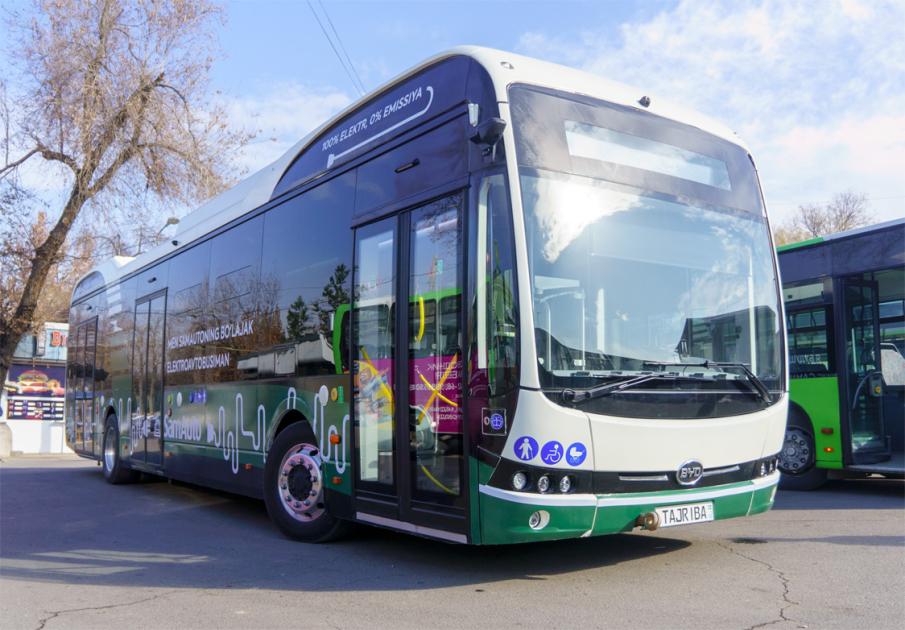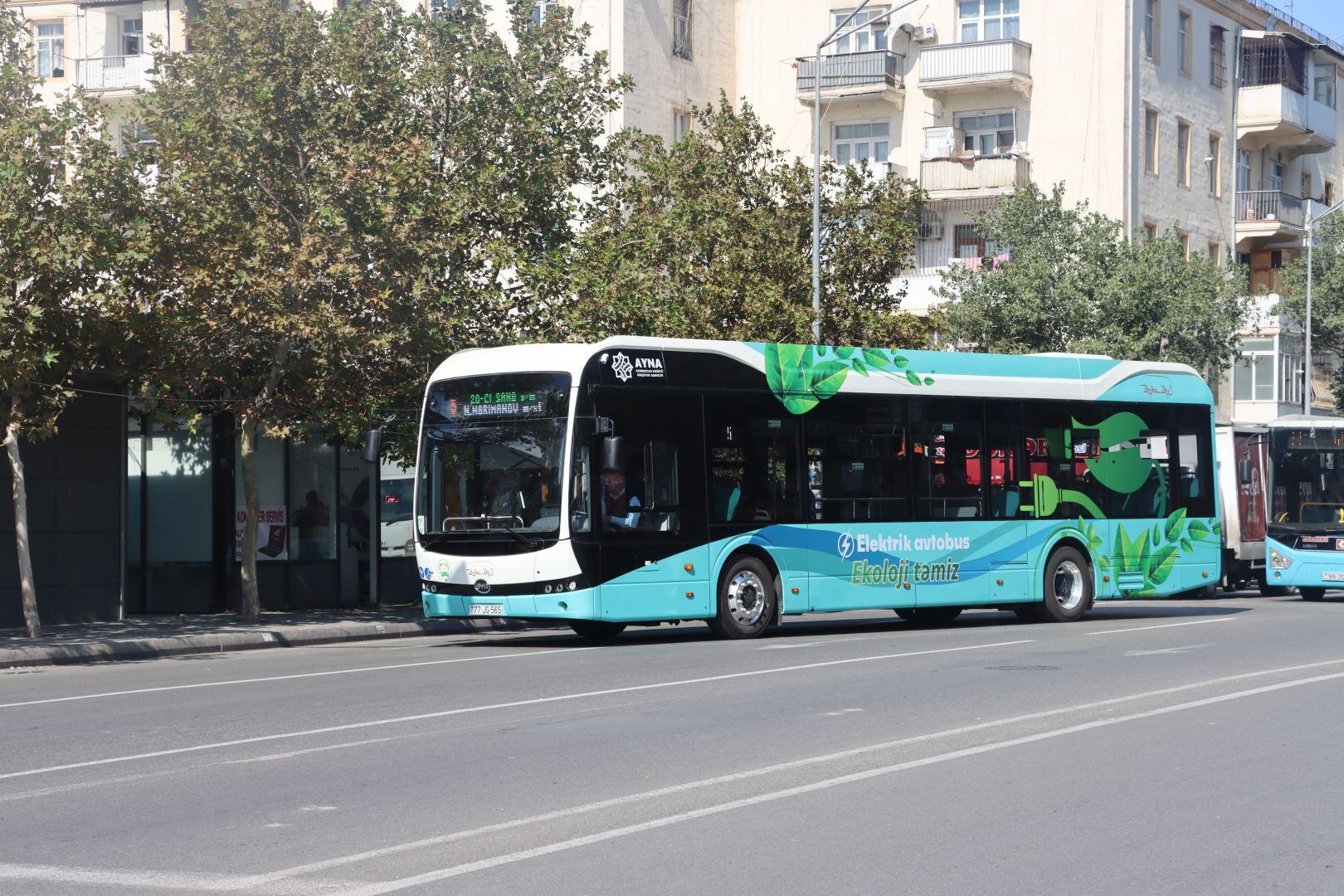Baku embraces electric bus revolution Towards zero-emission future
In recent years, a key trend in public transport development has been the introduction of electric buses, alongside electric trams, trolleybuses, and metros, aimed at achieving zero emissions in major cities worldwide by 2035. Similar "green" initiatives are gaining momentum in Azerbaijan. Specifically, Baku plans to replace three thousand internal combustion engine buses with electric buses.
Recently, a framework agreement was signed with the Chinese company BYD Company Limited for the purchase of electric buses, their assembly localization in the country, and the establishment of charging and service infrastructure. Over time, under the agreement with BYD, production of electric cargo and municipal transport is planned, with battery assembly for energy storage starting in 2028.
As of today, China leads the transition to electric buses. According to Bloomberg, China accounts for 99% of the world's electric bus production, and their exports are growing exponentially. This is not surprising considering that 95% of the world's lithium reserves—the main component of batteries—are located in China. Japan and South Korea are also striving to keep up with China's green initiatives. They are transitioning public transport from internal combustion engine buses to electric ones with government support. In Japan, this electrification effort is accompanied by the integration of computerized autonomous technologies with elements of artificial intelligence into public transport. Meanwhile, in South Korea, alongside electric buses, hydrogen fuel cell buses are being introduced. By 2026, Seoul plans to procure 1300 buses equipped with hydrogen fuel cells.
In North America, where priorities traditionally lean towards individual automobiles, the electrification of public transport is progressing slowly. Currently, only 0.5% of buses in the USA operate on electric power. Recently developed European countries have also approached the transition to electric buses cautiously. Significant reasons include the high costs of fleet upgrades and the necessity to build charging and service infrastructure from scratch.
However, after the European Commission (EC) took steps in 2021 to promote environmentally friendly passenger transport, processes for implementing electric buses in major cities have been accelerated in Germany, France, the United Kingdom, Norway, Sweden, and several other countries. At the beginning of this year, the European Parliament and the EU Council reached a political agreement to tighten CO2 emission requirements for freight and passenger transport. Consequently, by 2035, the EU will allow the purchase of only electric buses, and all freight transport, including refuse trucks, other communal vehicles, dump trucks, concrete mixers, food transport trucks, and so forth, must also transition to electric drive.
The advantages of electric buses include their absolute environmental friendliness due to zero emissions of harmful substances into the atmosphere. Another plus is their silence, as electric buses, like any type of electric transport, do not generate negative noise pollution. Importantly, the absence of a fuel system, complex mechanisms like internal combustion engines and gearboxes, ensures ease of operation and reduces repair costs due to fewer components. Finally, electric buses are significantly more economical than their gasoline or diesel counterparts: when comparing the hypothetical mileage per kilometre on gasoline versus electricity, electric transport clearly comes out as the more cost-effective option.

Summing up these factors, it can confidently be stated that the future of public transport in global megacities unequivocally belongs to electric buses. In this regard, Azerbaijan can be considered one of the most reform-minded countries in the post-Soviet space, aiming for the extensive electrification of urban public transport. Over recent periods, relevant agencies of the republic have been negotiating with companies from Belarus, China, Indonesia, and several other countries regarding the procurement and subsequent localization of electric bus assembly. Promising models have been selected and tested on the streets of the capital city.
In accordance with the plans of the Ministry of Digital Development and Transport of Azerbaijan, it is envisaged in the long term to replace approximately three thousand internal combustion engine buses in Baku and on the Absheron Peninsula with electric buses. The retired vehicles from the capital's routes are planned to be relocated to regions of the country, where over time they will also be replaced with electric buses. According to the relevant decree of the head of state, a decision has been made to procure electric buses from a company willing to establish their assembly in Azerbaijan.
The result of this work was the signing of a framework agreement with the Chinese company BYD Company Limited: recently, the document was signed by the First Deputy Minister of Economy of the Republic of Azerbaijan, Elnur Aliyev, the Deputy Minister of Digital Development and Transport, Rahman Hummetov, the Executive Director of BYD Commercial Vehicles, Tian Chunlong, and the Director of LLC Electrify Azerbaijan, Tariyel Rustamov. The agreement entails the purchase of electric buses, the organization of their servicing, and their production in Azerbaijan.
The Chinese company BYD has partnered with the local company Electrify Azerbaijan, part of the SARDA Group, with plans to localize electric bus production in the Sumgayit Chemical Industrial Park (SCIP). The project involves a $34 million investment aimed at assembling 500 electric buses annually. As part of the collaboration with BYD, local production of electric buses is expected to start around 2025, with a phased establishment of production for spare parts and components. It is projected that by 2030, localization levels will reach 40% of the total cost of electric buses. The project includes mechanisms for technical support, joint venture financing, intellectual property rights provision, and is anticipated to create 800 new jobs.
The Azerbaijan Investment Company (AIC) intends to join the electric bus production project in the country as a shareholder. Initially, BakuBus LLC will purchase 160 electric buses and 100 charging stations from BYD, aiming to deploy these vehicles on route lines in Baku by October 31, 2024. Additionally, the framework agreement with BYD Company Limited includes plans to commence collaboration from 2026 onwards in the production of light-duty electric trucks, electric vehicles for municipal services, and passenger electric vehicles. As part of this project, another joint venture is planned, with additional investments totalling $60 million.
Another area of cooperation outlined in the framework agreement with Chinese partners is the establishment of battery assembly in the country by 2028 for storing electrical energy. Today, alongside the development of renewable energy generation capacities, the mainstream adoption of "green" technologies includes the implementation of Battery Energy Storage Systems (BESS). BESS systems are used in electrical grids and other devices such as electric transport, solar and wind power stations, and smart homes, allowing energy to be stored. At a basic level, BESS consists of multiple batteries and smart sensors. These devices can be charged using surplus electricity generated, for example, by wind or solar power stations, or during periods of low demand from the grid. This stored energy can then be used at night or in other conditions when electricity generation is not possible.

According to research company BloombergNEF (BNEF), the global energy storage market grew nearly threefold in 2023, adding 45 gigawatts / 97 gigawatt-hours of energy storage capacity worldwide. This growth is driven by China, which is expected to remain the largest energy storage market in the world in 2024. According to BNEF's forecast, the global energy storage market is projected to grow annually by an average of 21% until 2030, reaching an annual capacity of 137 gigawatts / 442 gigawatt-hours.
For Azerbaijan, the field of energy storage is a relatively new and undeveloped sector, and cooperation with BYD on the production of battery systems represents a crucial step in this direction. It is pertinent to note that several years ago, a resident of the Sumgayit Chemical Industrial Park (SCIP), Azmonbat LLC (a joint venture established by Bulgaria's Monbat Group and Azerbaijan's EPC Group), launched a facility for the recycling of 30 thousand tons of lead-acid batteries. The company plans to expand into the production of automotive batteries using recycled materials.
Another project in a similar vein is being pursued by the local company Sakuraz Green Energy (SGE). Their factory in the capital focuses on manufacturing and refurbishing various types of batteries using BSI technologies, which extend battery life and significantly reduce costs. This initiative has drawn keen interest from Azneft State Oil Company and the State Oil Company of Azerbaijan Republic (SOCAR), which recently signed a strategic cooperation agreement with SGE for servicing battery packs and energy storage systems (BESS).
Looking ahead, considering the plans to develop renewable energy systems (RES), whose share in Azerbaijan's total generation is set to increase to 33% by the end of 2027 through new projects adding 2 GW of "green" capacity, it is clear that the development of BESS systems in our country will become an indispensable trend.








